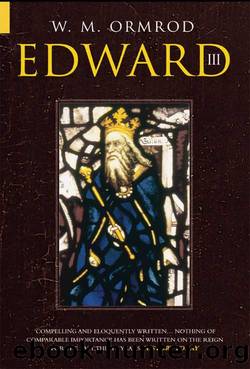Edward III by W M Ormrod

Author:W M Ormrod
Language: eng
Format: epub
Tags: Edward III
ISBN: 9780752468938
Publisher: The History Press
Published: 2011-09-28T16:00:00+00:00
The relations between Church and state under Edward III provide some interesting insights into royal policy, and obviously invite comparison with what was going on in secular politics at the same time. Edward III encountered little effective pressure from his clerical subjects until after the opening of the Hundred Years War, and it was only the precedents set by parliament and taken up by Archbishop Stratford that probably persuaded the clergy to seek legislative concessions in return for grants of taxation. Between 1340 and 1352 they won some notable victories which theoretically guaranteed their immunity from the royal courts, their exemption from purveyance and other prerogative levies, the limitation of regalian rights over the Church, and the restriction of the crown’s ecclesiastical patronage. On some matters – notably the question of appointments – the king was prepared to honour the new settlement and stood by his promises for most of the rest of the reign. But in 1356–7 he reasserted his authority over the Church by seizing the Bishop of Ely’s temporalities and by refusing the clergy the right to make conditions on the payment of taxation. This royal revanche caused considerable unease in clerical circles, and may even have precipitated Archbishop Thoresby’s resignation from the chancellorship. But in the end no political crisis occurred. And by the 1370s, when some of the lower clergy and at least one of the bishops began once more to question the king’s policies, the opportunity to advance their political programme had passed. The emptiness of so much of the ecclesiastical legislation passed during the middle years of the fourteenth century serves to remind us of the crown’s tendency to forget its former promises once the moment of conflict had passed. The inability of the lower clergy to forward their demands in the 1370s also provides an obvious parallel with the growing political frustration felt by the commons after the reopening of the French war. And the fact that these disaffected groups were increasingly antagonistic to each other possibly explains why the crisis of 1376 did not take place earlier. In its later stages, Edward III’s regime was maintained not so much by the strength of the monarchy as by the inability of its opponents to mount an effective opposition.
To conclude this chapter on such a negative point would be a great mistake. It should be remembered that for much of his long reign Edward III was able to mobilize the resources of the Church in the service of the state and to persuade the English clergy to give active and enthusiastic support to his foreign ambitions. The undercurrent of discontent, unmistakable though it was in the 1330s and the 1370s, never really threatened the king’s de facto sovereignty over the clergy. In the end, the quarrel with Archbishop Stratford did little to alter the balance of power between Church and state, and the very absence of similar controversies later in the reign served to emphasize the king’s growing authority over the ecclesiastical hierarchy.
Download
This site does not store any files on its server. We only index and link to content provided by other sites. Please contact the content providers to delete copyright contents if any and email us, we'll remove relevant links or contents immediately.
Blood and Oil by Bradley Hope(1259)
Daniel Holmes: A Memoir From Malta's Prison: From a cage, on a rock, in a puddle... by Daniel Holmes(1125)
Ambition and Desire: The Dangerous Life of Josephine Bonaparte by Kate Williams(1096)
Wandering in Strange Lands by Morgan Jerkins(1023)
It Was All a Lie by Stuart Stevens;(950)
What Really Happened: The Death of Hitler by Robert J. Hutchinson(879)
London in the Twentieth Century by Jerry White(855)
Time of the Magicians by Wolfram Eilenberger(849)
Twilight of the Gods by Ian W. Toll(820)
The First Conspiracy by Brad Meltzer & Josh Mensch(817)
The Japanese by Christopher Harding(809)
A Woman by Sibilla Aleramo(804)
Lenin: A Biography by Robert Service(786)
The Devil You Know by Charles M. Blow(785)
Reading for Life by Philip Davis(782)
Cleopatra by Alberto Angela(773)
Twelve Caesars by Mary Beard(773)
The Life of William Faulkner by Carl Rollyson(720)
1965--The Most Revolutionary Year in Music by Andrew Grant Jackson(719)
